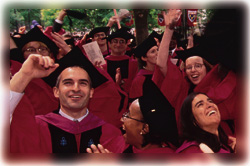![]()
Main Menu · Search · Current Issue · Contact · Archives · Centennial · Letters to the Editor · FAQs
![]()
Main Menu · Search · Current Issue · Contact · Archives · Centennial · Letters to the Editor · FAQs
 At the end of a long road: newly minted Ph.D.s. Jim Harrison At the end of a long road: newly minted Ph.D.s. Jim Harrison |
The lives of graduate students--often the most impecunious and loneliest of scholars--are about to improve on both counts. During the next two academic years, the Graduate School of Arts and Sciences (GSAS) will use an infusion of new money from the endowment (see "The Payoff") to expand financial aid by an aggregate of $5 million annually--a 25-percent increase. At the same time, the system of advising the 3,000-plus graduate students is being restructured.
Last spring, the Faculty of Arts and Sciences began to revise graduate financial aid by adopting a series of "cost-neutral" changes such as guaranteeing students four-year aid packages, including teaching fellowships (see "Two More Years," July-August 1998). Faculty members and administrators also agreed more funds would be needed. The increased endowment payout covers a substantial part of the aid gap identified by FAS.
The new funds, according to GSAS administrative dean Margot N. Gill, will enable the school to extend multiple-year tuition offers, two years of living stipends, and two years of teaching fellowships: terms more in line with those offered by peer schools. In addition, Harvard intends to boost the living stipend from $12,000 per 10-month academic year to $13,500.
Exactly how the funds are applied will vary by department and program. Christoph J. Wolff, dean of GSAS and Mason professor of music, says some students may use the support for summer language study related to their research, others may receive support as they write their dissertations (when teaching duties might be distracting). This fall, he says, the focus will be on humanities and social-sciences students, "where the need is greatest" because of the unavailability of external funds typically offered to students in the sciences.
All graduate students are already being affected by GSAS attempts to improve advising. "What we hear from students perennially," through surveys and comments from the Graduate Student Council, Gill says, "is that they're looking for more regular feedback on their status, minimally on an annual basis." Last spring, Wolff and Dudley House master Everett Mendelsohn, professor of the history of science, initiated a series of workshops on "succeeding in graduate school," and small dinners for face-to-face discussion of issues such as how to overcome feeling intimidated by an adviser. In some sessions, a University Health Services staff member joins in as participants probe ways to deal with stress and isolation.
In the case of the "crucial working relationship" with a principal dissertation adviser, Wolff acknowledges, "you can't solve [problems] by administrative fiat," particularly across 47 doctoral programs. Nonetheless, he has created a committee of seven faculty members to produce a structure for advising in all departments. He expects the committee to recommend treating a student's dissertation work as a "contract" not just with a single advising professor, but with the full department--a practice already in place in some departments. Requiring dissertation advising to become a committee responsibility with uniform procedures, he says, gives students wider access to expertise in their fields, and avoids disruption in case an adviser goes on leave, retires, or dies.
That may also solve a more serious problem. Last August, Jason Altom, a fifth-year chemistry graduate student, committed suicide--the third such death among graduate students in a year. A note Altom left said, in part, "I know things would be different" if he had worked with multiple advisers instead of just one professor, Elias J. Corey, Emery professor of organic chemistry, the 1990 Nobel laureate.
In September, James G. Anderson, Weld professor of atmospheric chemistry and the new chairman of the department of chemistry and chemical biology (CCB), promulgated extensive changes in its advising system. Recognizing the department's "obligation" to help students cope with "the potential for frustration, for disappointment, and for isolation" that can accompany research, Anderson created three-person pre-thesis committees, with a requirement for formal, annual reviews of work by the committee members and the student. He also introduced frequent informal dinners with students; confidential channels for students to seek advice and counseling, at department expense; and a survey to elicit ideas to improve the department.
Although Gill points out that changes in advising began before Altom's death, she says, "The loss of this student does focus your attention on what more you might be doing in human terms." Beyond the minimum standards GSAS seems likely to establish, departments are free to take much more aggressive steps--as CCB has done --to make graduate study a less lonely, potentially frightening, ordeal.
Main Menu · Search · Current Issue · Contact · Archives · Centennial · Letters to the Editor · FAQs
![]()